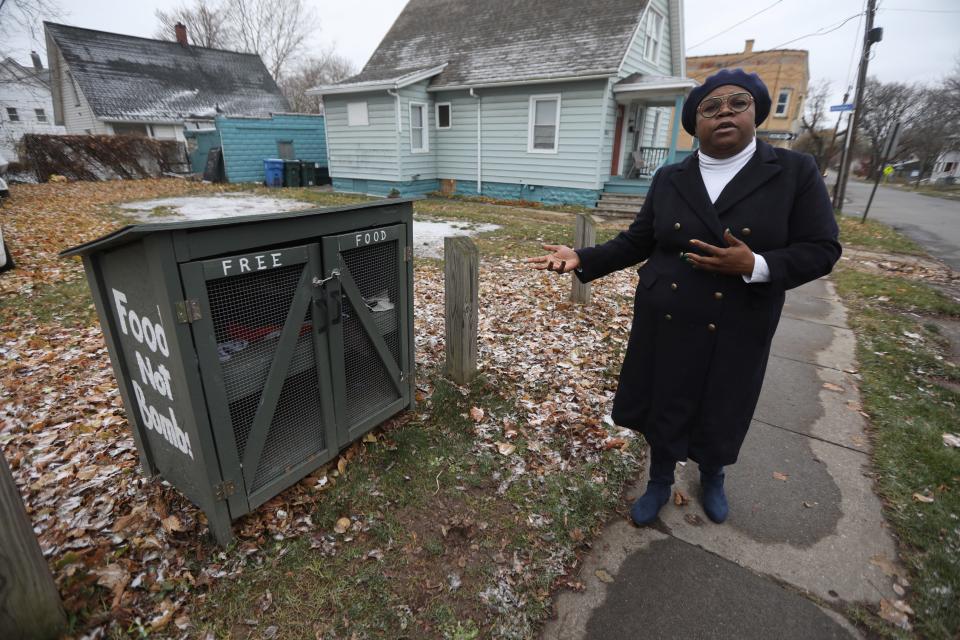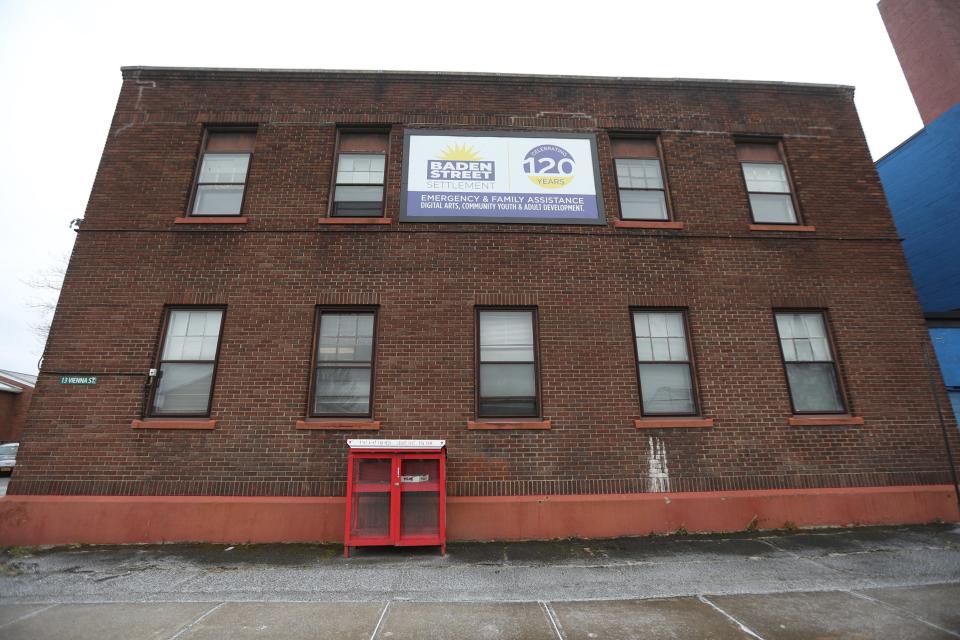Free food stands were built to fight hunger in Rochester. But where did all the donors go?
A piece of torn notebook paper hung across the bare shelves of a free food stand on Cameron Street.
“More food! Plz! Hungry,” it read.
Roc Food Not Bombs, a local activist group, posted a photo of the note on Facebook in March, urging neighbors to continue to donate groceries and household supplies to one of the nearly 40 free food stands built across the city over the last two years.
Nine months later, volunteers say the need for donations is just as prevalent.
Once brimming with supplies donated through the good will of neighbors, Rochester’s network of free food stands now often sit cold, empty and useless to those they were meant to help.

“I would say we’re seeing definitely a 90 to 95% reduction (in donations),” said Chiara Smith, who helped build several free food stands in the 14621 Zip code, where city officials say nearly 60% of children live in poverty.
In August she watched as a young child approached one stand only to open it in disappointment, finding nothing inside.
Smith purchased groceries for the boy’s family and posted her own plea for help on Facebook.
“Just a reminder that there’s still a food shortage in our community,” she wrote.
Food insecurity persists in the Rochester region
About 30% of city residents live below the poverty line, according to the U.S. Census Bureau ― nearly double that of the state. The median household income across the city is $40,083, compared to a statewide median of $75,157.
Free food stands were built as part of an aspirational project to reduce food insecurity in some of the city’s poorest neighborhoods.
More:Free food stands, part of mutual aid movement, expand into Rochester suburbs
During the COVID-19 pandemic, unemployment skyrocketed, state or federal aid was limited, and traditional food charities like soup kitchens faced restrictions trying to stop the spread of the virus.
Roc Food Not Bombs stopped serving weekly hot meals at Nathaniel Square Park, but donations from the public market and other vendors were still coming.
The aid group built its first few free food stands across the city to distribute the donations.
With the support of others like Smith, the project exploded into 40 free food stands between the city and neighboring suburbs. The structures held free food and personal items that could be taken by those in need at any time, anonymously and without the paperwork or restrictions of other charities.
And volunteers who built the stands hoped the surrounding community would adopt them ― regular people offering donations from their own pantries or grocery runs to help feed their struggling neighbors in the purest form of mutual aid.
For a time, it worked, stands spilling over with donations of everything from canned goods to fresh fruits and vegetables to a Wegmans cookie cake.

But a recent visit to five food stands last month found each of them nearly bare, with single cans of beans or boxes of pasta left to grab, if anything.
And high inflation has introduced a new barrier to food even as many have returned to work.
A carton of a dozen eggs at grocery stores across the nation averaged $1.71 in November 2021, according to the Bureau of Labor Statistics.
A year later, a dozen eggs sells for more than double that: $3.59.
Milk rose from $3.67 to $4.23 per gallon, on average.
And the cost of chicken breasts increased 22%, from $3.62 per pound to $4.42 per pound.
“If it’s hard for working people, it’s harder on the poor,” Smith said. “We already live in a food desert, so these people go to the corner store and they were already paying $5 for a gallon of milk. So now they’re probably paying $7 or $8.”
Smith said she hopes the community will get more involved, even if in small ways.
“The food stands are still utilized,” she said. “People utilize them in the way that they can: They get what they can get. So, if that is an extra hat, if you bought an extra pair of gloves, two rolls of extra paper towel … I think whatever you have that you can give, people will always have a need.”
More:Grassroots mutual aid groups connect neighbors, resources with no strings
How to donate
Roc Food Not Bombs hosts a list of all 40 free food stands on their website rocfoodnotbombs.com with a simple reminder: “Anyone can drop off donations to any of the food stands at any time.”
Volunteers offer the following guidance:
Consider whether a food item needs additional supplies, like oil or eggs, to prepare. Consider personal care or essential household items like toothpaste, toilet paper, pet food and more.
Consider the quality of food items: Would you eat it? Do not donate expired or open food.
Consider the weather: Will these donations hold up in freezing or hot temperatures?
Help maintain the stands if you can. Remove rotten food, wipe down and sanitize shelves, or repair broken doors if you’re capable.
This article originally appeared on Rochester Democrat and Chronicle: Once brimming with donations, Rochester's free food stands now sit bare

